Review: 1776 at The Muny Shows Scuffles and Snags to Independence
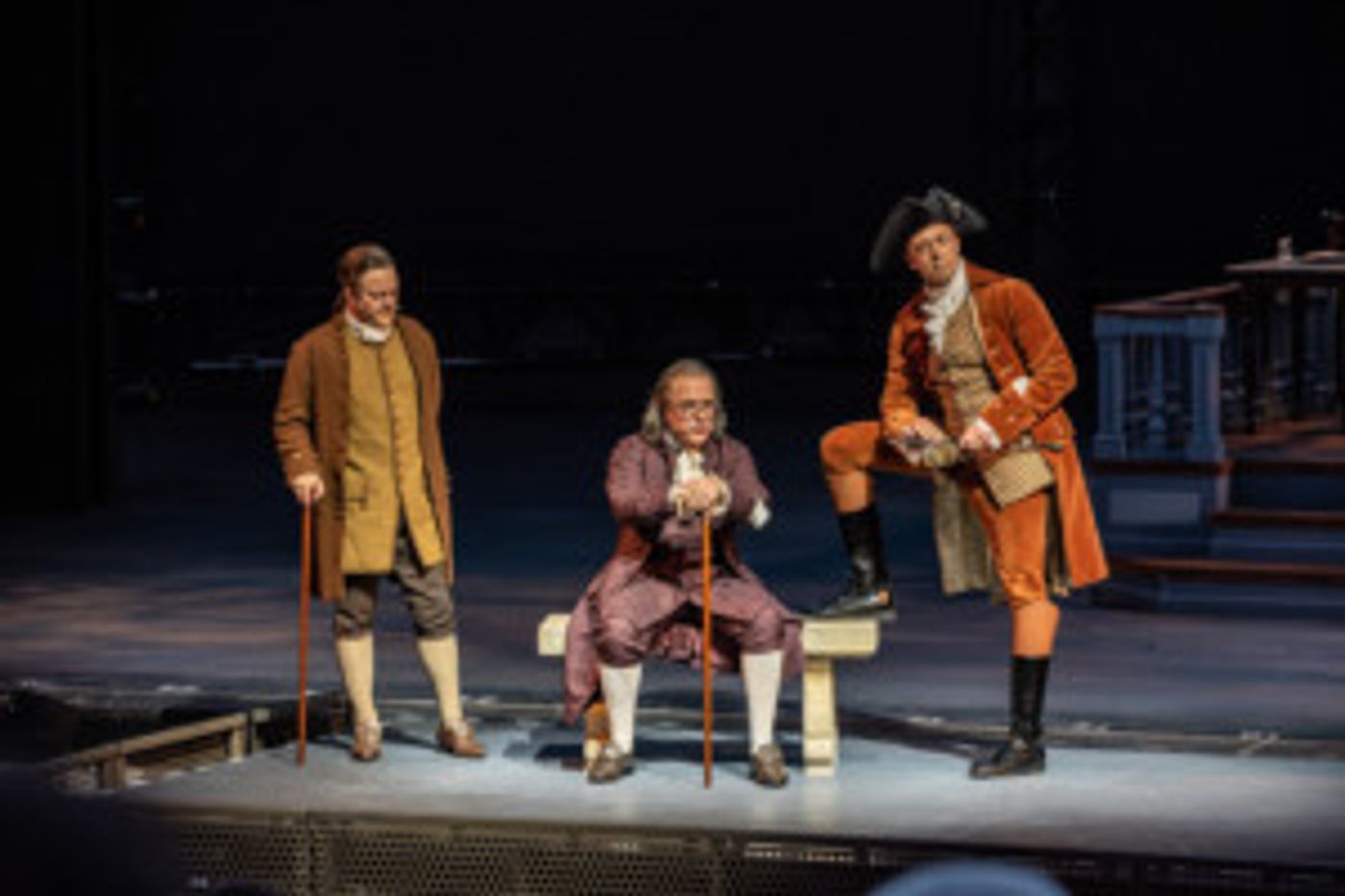
Three-time Tony Award-winning 1776 with music and lyrics by Sherman Edwards and book by Peter Stone is based on the events in Philadelphia leading up to the creation of the United States of America's Declaration of Independence, by making real people of historical giants like John Adams, Benjamin Franklin, and Thomas Jefferson. It is with drama and comedy that this dialogue-heavy musical invites us to enter the chamber of the Second Continental Congress and sit for a while with our country's forefathers as they struggle to figure out how to give birth to a new country.
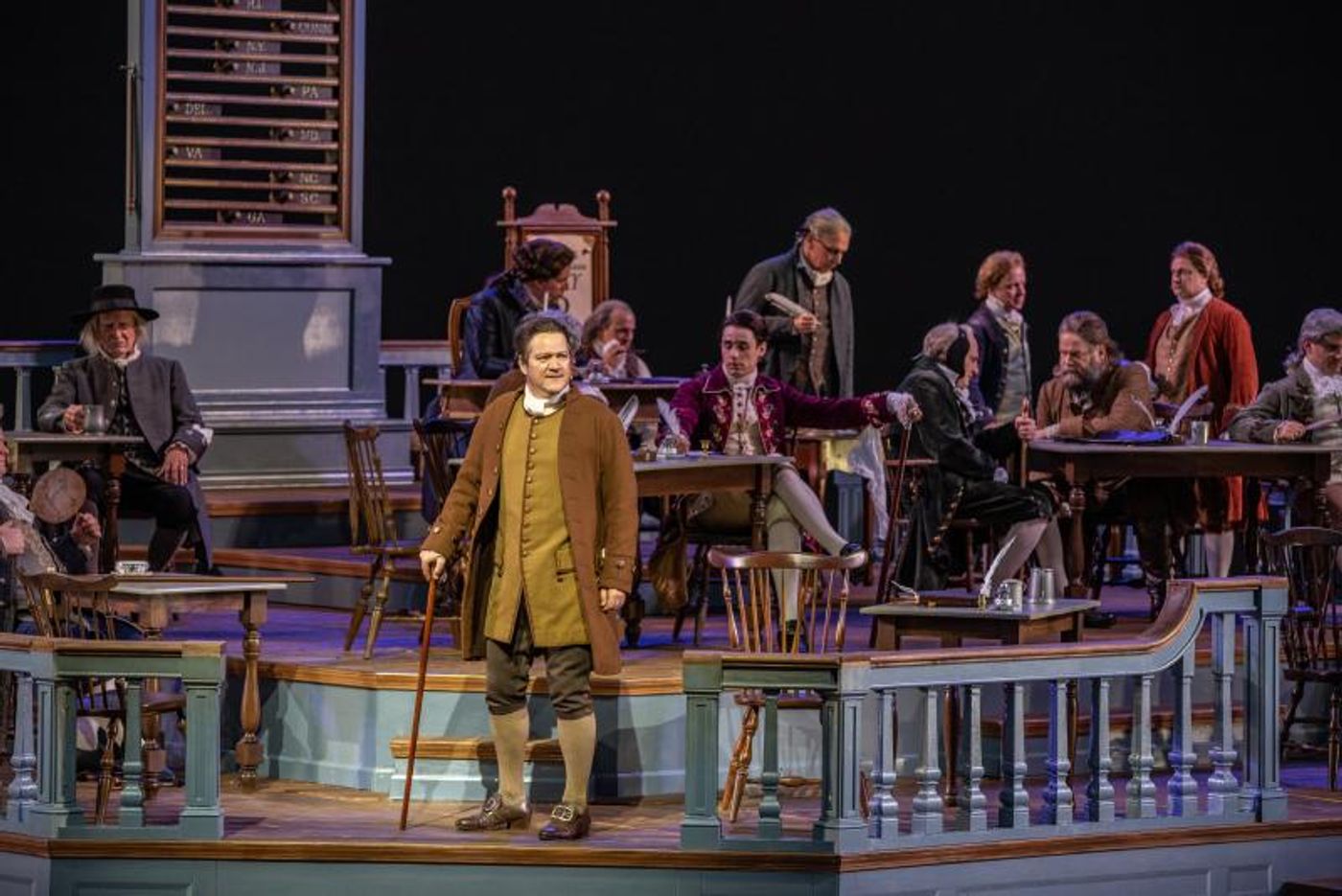 The musical opens with a commanding drumbeat. The calendar reads May 8. John Adams (Robert Petkoff) is funnily frustrated with his colleagues in Congress during a hilarious opening number "Sit Down, John" as they all refuse to entertain his proposal to vote for independence. All 20+ of the similarly-dressed white men onstage are quarrelsome in the heat, piddling, twiddling, and resolving, and not one damn thing resolving, as the next number goes. It's sometimes difficult to tell who is speaking or singing, but it matters little because soon enough the personalities emerge and we are actively invested in the important business being conducted here.
The musical opens with a commanding drumbeat. The calendar reads May 8. John Adams (Robert Petkoff) is funnily frustrated with his colleagues in Congress during a hilarious opening number "Sit Down, John" as they all refuse to entertain his proposal to vote for independence. All 20+ of the similarly-dressed white men onstage are quarrelsome in the heat, piddling, twiddling, and resolving, and not one damn thing resolving, as the next number goes. It's sometimes difficult to tell who is speaking or singing, but it matters little because soon enough the personalities emerge and we are actively invested in the important business being conducted here.
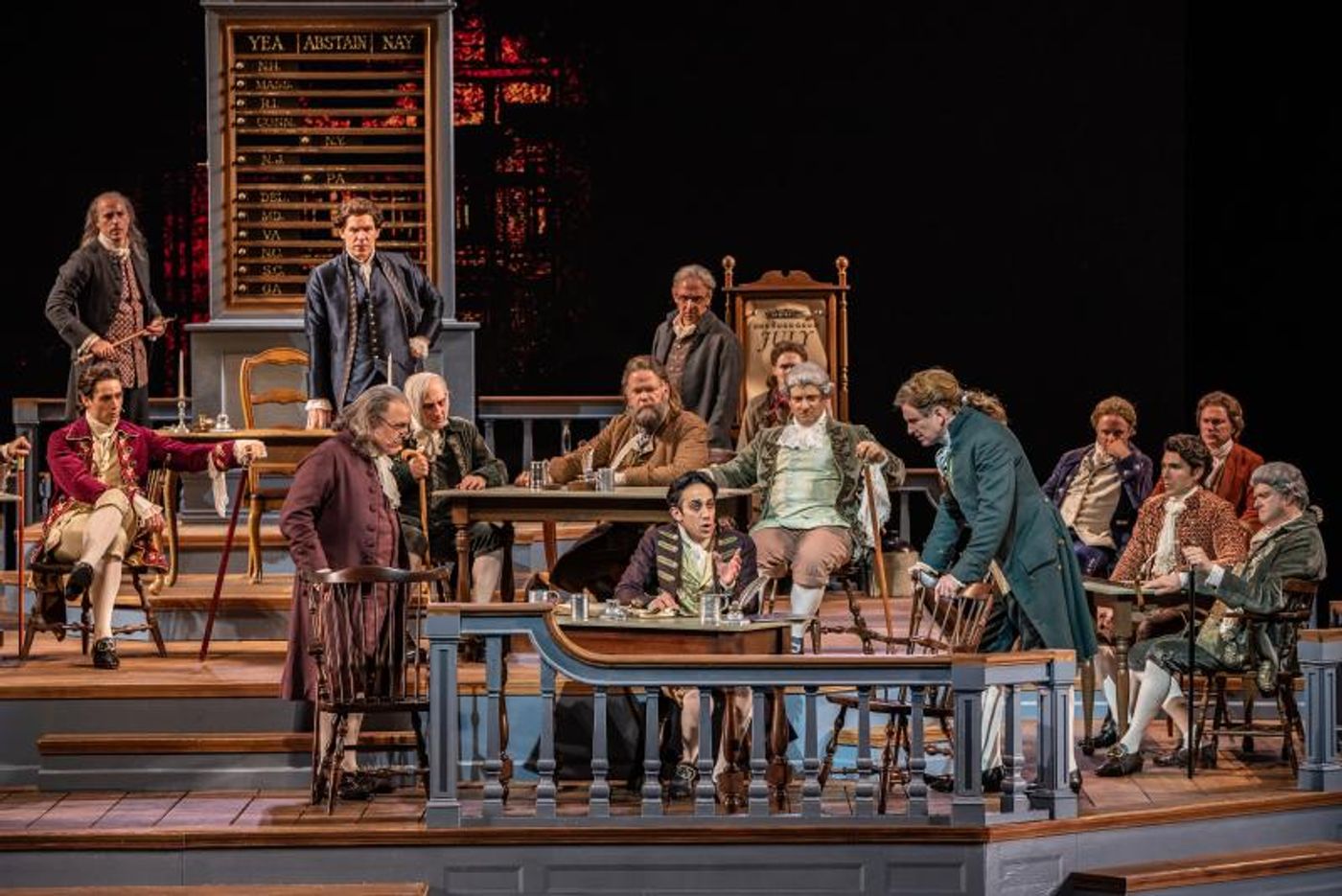 Adams representing Massachusetts is all business, and the others find him to be obnoxious and annoying. Franklin (Adam Heller) from Pennsylvania, in his infinite wisdom, provides many familiar nuggets of reason and wisdom. Hopkins (Joneal Joplin) from Rhode Island claims to be the oldest member of Congress, and he's just there for the free rum. Lee (Ryan Andes) from Virginia is lots and lots of amusing bravado. Rodney (Philip Hoffman) from a divided Delaware is a bit overwhelmed by it all. Livingston (J.D. Daw) and Morris (Larry Mabrey) from New York keep abstaining, "courteously" of course, because their legislature has not given them explicit instructions on how to vote for anything either way. Hancock (Michael James Reed), the President of Congress, is tasked with keeping these often-cantankerous men on task, and he makes a valiant attempt to do so.
Adams representing Massachusetts is all business, and the others find him to be obnoxious and annoying. Franklin (Adam Heller) from Pennsylvania, in his infinite wisdom, provides many familiar nuggets of reason and wisdom. Hopkins (Joneal Joplin) from Rhode Island claims to be the oldest member of Congress, and he's just there for the free rum. Lee (Ryan Andes) from Virginia is lots and lots of amusing bravado. Rodney (Philip Hoffman) from a divided Delaware is a bit overwhelmed by it all. Livingston (J.D. Daw) and Morris (Larry Mabrey) from New York keep abstaining, "courteously" of course, because their legislature has not given them explicit instructions on how to vote for anything either way. Hancock (Michael James Reed), the President of Congress, is tasked with keeping these often-cantankerous men on task, and he makes a valiant attempt to do so.
The men continue hashing out what would be the rules of independence anyway-that is, if they could ever even agree it's a good idea. Would the states be sovereign, or ruled by someone in Massachusetts? How would they build a respectable military on "spirit" alone? What about slaves - would they be free and independent Americans as well? And why must all of this be decided now?
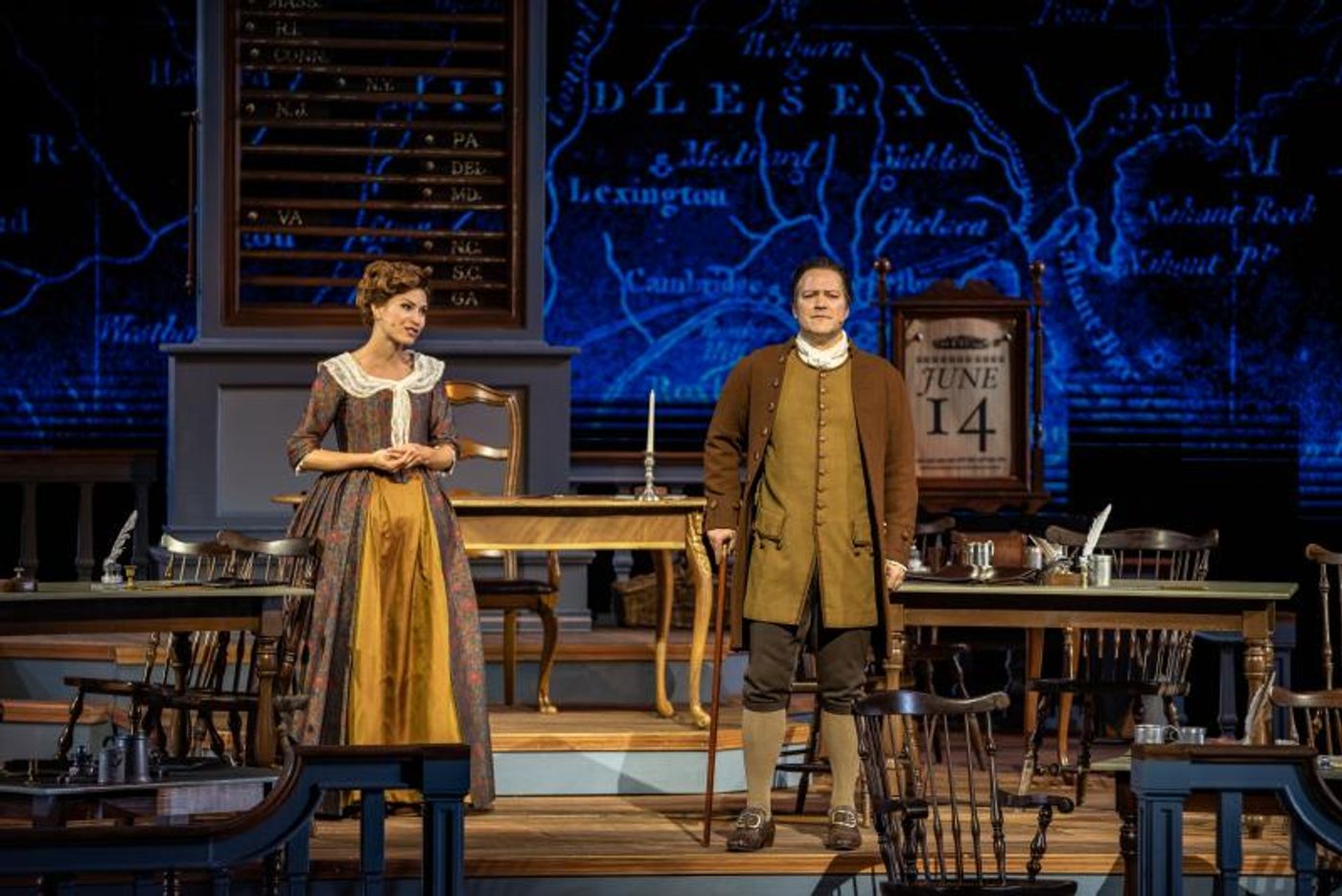 As they work through the issues and keep coming to an impasse, Adams moves for a postponement and proposes a written Declaration, which should take about three weeks to compose. After some disagreement about who will actually author the thing, Jefferson (Keith Hines), the quiet intellectual who desperately just wants to get back home to Virginia and enjoy his new bride, is designated. Jefferson is experiencing a bit of writer's block, however, and can't seem to get words on paper until his sweet Martha (Ali Ewoldt) shows up and gives him a little "inspiration." Abigail Adams (Jenny Powers), who writes often from Massachusetts, is also eager to reunite with her husband John, as day-to-day life is challenging without him there.
As they work through the issues and keep coming to an impasse, Adams moves for a postponement and proposes a written Declaration, which should take about three weeks to compose. After some disagreement about who will actually author the thing, Jefferson (Keith Hines), the quiet intellectual who desperately just wants to get back home to Virginia and enjoy his new bride, is designated. Jefferson is experiencing a bit of writer's block, however, and can't seem to get words on paper until his sweet Martha (Ali Ewoldt) shows up and gives him a little "inspiration." Abigail Adams (Jenny Powers), who writes often from Massachusetts, is also eager to reunite with her husband John, as day-to-day life is challenging without him there.
Once the Declaration is written, there are edits and revisions to be made before a unanimous vote can be reached, and therein lies more conflict. In the end, the Declaration is signed in a closing scene that builds steadily, signature by signature, to an amazing cacophony of sounds and visuals that prompt unrestrained applause by the audience.
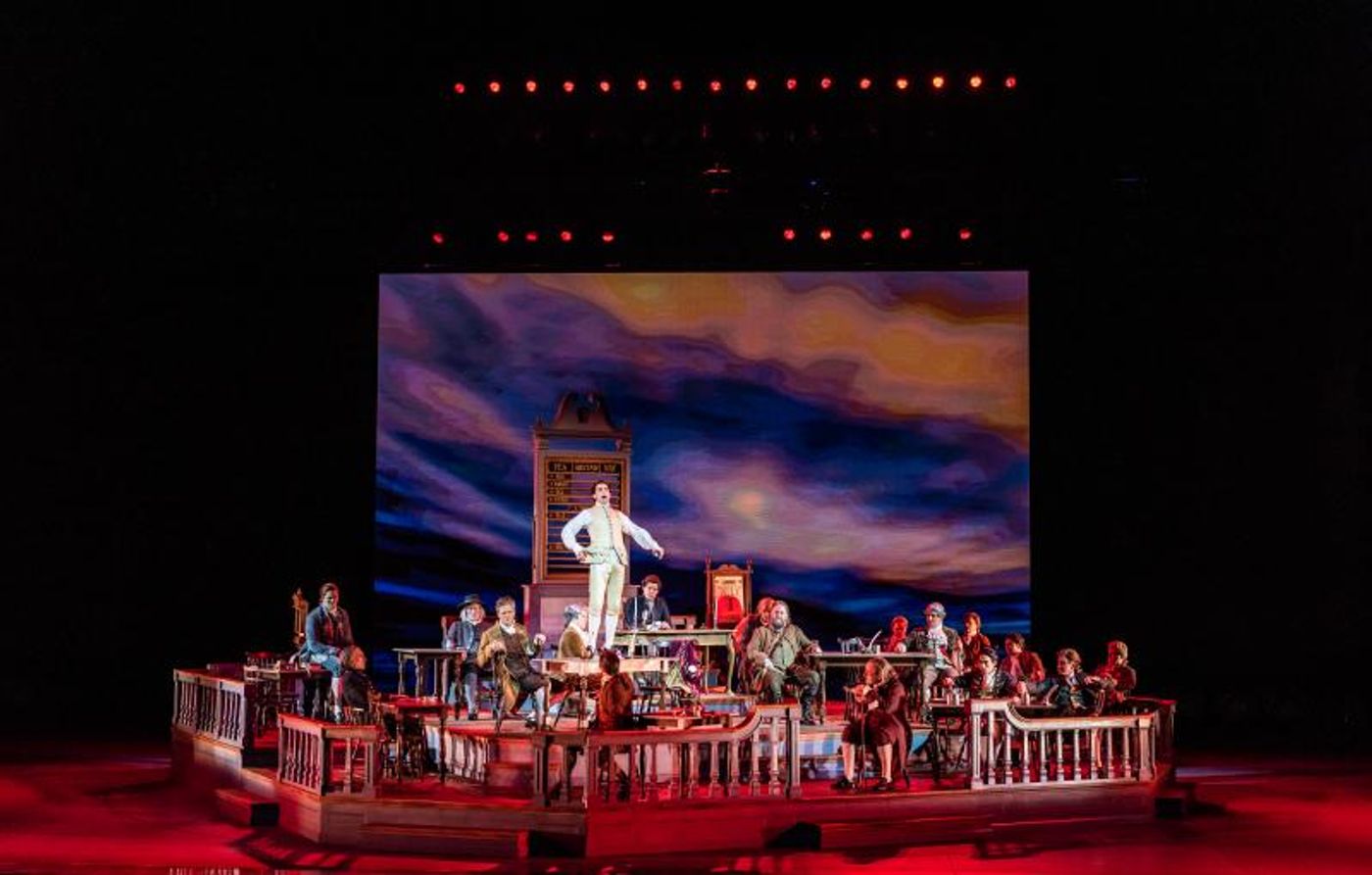 The entire company is remarkable, directed skillfully by Rob Ruggiero. The show is (and seems) long at almost three hours including intermission, but despite its extensive stretches of dialogue about a bunch of white dudes discussing their business, the plot moves along quickly enough. Keeping in mind that artistic additions, deletions, and revisions have been made for the sake of story, it is an educational and informative way to watch negotiations take place that you've probably only ever read about in history books. Especially notable performances include Petkoff and Powers in the song, "Yours Yours Yours" where Powers' exquisite voice is on full display. Also, Bobby Conte Thornton, who plays South Carolina's Edward Rutledge, is magnificent in a disturbing and breathtaking performance of "Molasses to Rum."
The entire company is remarkable, directed skillfully by Rob Ruggiero. The show is (and seems) long at almost three hours including intermission, but despite its extensive stretches of dialogue about a bunch of white dudes discussing their business, the plot moves along quickly enough. Keeping in mind that artistic additions, deletions, and revisions have been made for the sake of story, it is an educational and informative way to watch negotiations take place that you've probably only ever read about in history books. Especially notable performances include Petkoff and Powers in the song, "Yours Yours Yours" where Powers' exquisite voice is on full display. Also, Bobby Conte Thornton, who plays South Carolina's Edward Rutledge, is magnificent in a disturbing and breathtaking performance of "Molasses to Rum."
Luke Cantarella's elaborately-built congressional chamber is set nicely atop The Muny's enormous turntable, and while it is the only real set piece, we are able to enjoy it from multiple views and angles. It goes without saying that Alejo Viette's costumes and Leah J. Loukas' wigs are as sumptuous and realistic as one might expect from The Muny, and of course The Muny Orchestra under James Moore's outstanding direction, sounds brilliant and bright on a summer night. If you can 1) get over the length of the time you'll be sitting in your seat to immerse yourself in the story, 2) forego any expectations of danc-y numbers, and 3) come prepared for the heat, you will likely very much enjoy this artistic interpretation of America's birth all those years ago. So do yourself a favor and take a long afternoon nap and then head on over to The Muny, where 1776 plays every night until July 3. The all-American in you will appreciate the timing of it as you head into next week's fireworks, flags, and hot dogs. For tickets and information, https://muny.org/1776-the-musical/.
Reader Reviews
Videos

